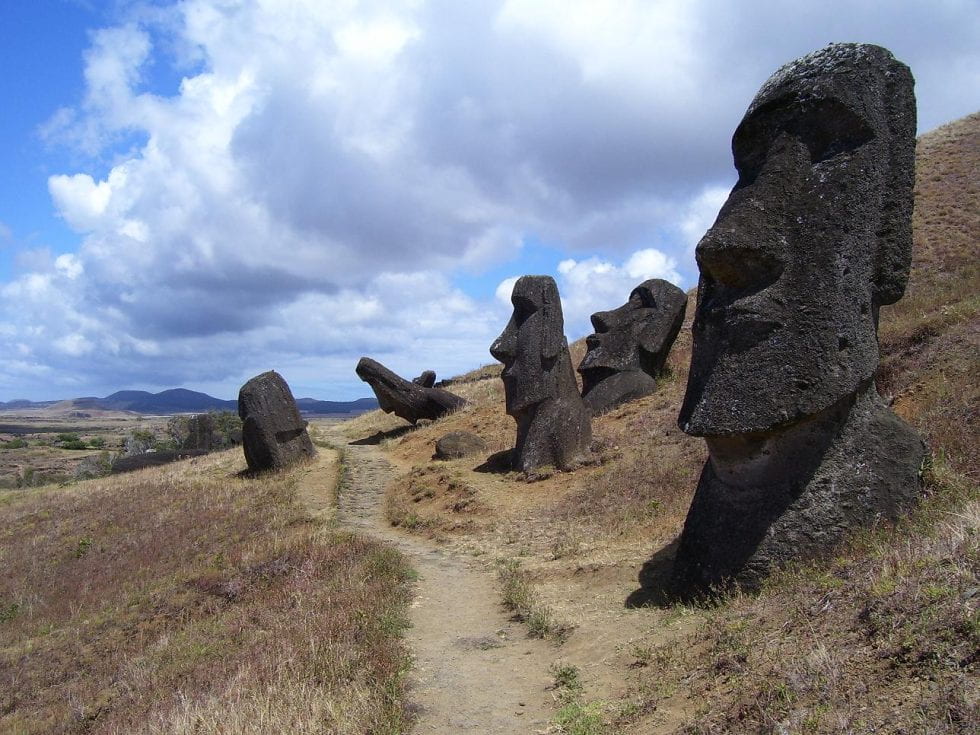Rapa Nui, also known as Easter Island, is famous for its moʻai, giant human-like figures carved out of stone that can weigh more than 80 tons. It is an island with a rich history that has been communicated over the generations through oral histories and hundreds of archeological sites, and now DNA research is allowing new explorations into the island’s prehistoric origins.
A new PBS NOVA documentary, “Easter Island Origins,” highlights the research of UC Santa Cruz Assistant Professor of Biomolecular Engineering and Genomics Institute Affiliate Alexander Ioannidis, which has helped the current inhabitants of Rapa Nui gain new insights into their ancestry.
The Rapa Nui people have long known that their ancestors are Polynesian, but when and where the original people came to the Pacific island from has been a source of debate. Previous research has shown that Polynesian settlers came from the islands of East Asia, but others have used the evidence of South American crops found in the region to suggest that Polynesians also had origins in South America. Past archeological studies have been unable to fully prove this link, but new DNA research is now confirming the theory.
The PBS documentary features research Ioannidis published in the journal Nature in 2020 and 2021 when he was an adjunct professor at Stanford University, before joining the UCSC faculty. He was a part of a large international research team that worked with Rapa Nui elders and others who were excited to learn more about their history and agreed to provide DNA samples. The research group ultimately recruited 807 participants from 17 island populations and 15 Native American groups along the Pacific Coast of Central and South America.
Using these samples, Ioannidis conducted a genome-wide variation analysis for signs of Native American admixture. He expected to find mostly Polynesian, Spanish, and Chilean ancestry in the Rapa Nui DNA, since those were the main groups that contributed to the island over the last few centuries. The results helped confirm many participants’ oral histories about their origins from these three regions, but it also contained some surprises.
Some segments of DNA found throughout the population of Rapa Nui were most similar to that of the Zenú people, an indigenous group that has inhabited the coast of Colombia for hundreds of years. Ioannidis and his team were able to measure the chromosome segment length in the samples they had collected to determine that these segments had entered the Rapa Nui population around 1200 AD.
Similar DNA segments were also found in DNA from other island populations in the region, which indicates that a single contact event between Polynesian and Colombian ancestry groups produced descendants who then migrated to these different Pacific islands and settled there. The research team was even able to use genetic markers to plot the likely migration path to the Tuamotu Archipelago, up to the Marquesas, and eventually all the way to Rapa Nui.
The research team shared the results of their analyses with the individual participants in the study and helped them understand more about their individual lineages. The PBS documentary interviews a few of these participants who were happy to learn more about their ancestors’ histories.
“What I really love about genetics is that it is essentially about participation with the people whose story you are telling,” Ioannidis says in the documentary. “It is their sample that is telling the story.”
Ioannidis is currently working with UC Santa Cruz students to continue his studies into the genetics of diverse and underrepresented populations via collaborations with scientists from Latin America and the Pacific Islands. He hopes that this research will extend the availability of personalized medicine to all groups through a better understanding of the genetics of people from diverse ancestries.
– SHARE THIS STORY –
You May Also Be Interested In
-

2025 Dean’s Awards highlight outstanding Baskin Engineering undergraduate research in AI, cybersecurity, biomedicine, and more
-

Baskin Engineering students sweep SC Launchpad 2025 awards in technology and social impact categories
-

First annual UC Open Summit highlights open source innovation in the UC system

